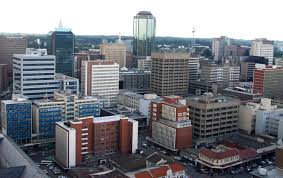
By Tim Middleton
No matter in which country we live, it seems everyone wants to live in the city nowadays. The city is the place to be; the question is: Which city is the place to be? Is it one of London or Paris, the two cities that Charles Dickens wrote about in his well-known novel, A Tale of Two Cities, with its powerful and memorable opening lines: “It was the best of times, it was the worst of times, it was the age of wisdom, it was the age of foolishness, it was the epoch of belief, it was the epoch of incredulity, it was the season of light, it was the season of darkness, it was the spring of hope, it was the winter of despair, we had everything before us, we had nothing before us.”
There is a country not too far from us here in Zimbabwe which has numerous high, rocky, steep mountains as well as hot, barren deserts and deep, dark valleys, along with frequent earthquakes, droughts and other natural disasters. Which nation is this? It is called Exami-Nation with its capital Adver-City whose suburbs are called Hardship, Difficulty, Danger, Disease, Inflation, Injustice, Corruption and Poverty. It is a tough place to live, but the people learn so much there, not least because within this city of Adversity, there are various schools: There is the School of Hard Knocks, the School of Lucky Breaks and the School of Silly Mistakes (where some people repeat their course).
What the Dickens are we talking about? Actually, we should be asking, What the Disraeli are we talking about, because Benjamin Disraeli, who became the British Prime Minister four years after Dickens wrote Tale of Two Cities, once said that, “There is no education like adversity”. People learn a great deal from adversity, more so than from Univer-sity. Thomas Hardy, a contemporary of Dickens, wrote very popular tragic novels and when asked why he always wrote about people going through difficult situations he referred them to a line from one of his poems, which said, “If a way to the better there be it exacts a full look at the worst” — there is no education like adversity. In a similar way, Malcolm Gladwell, a modern writer, argues that, “We spend a lot of time thinking about ways that prestige and resources and belonging to elite institutions make us better off. We don’t spend enough time thinking about ways in which these kinds of material advantages limit our options.” He too recognises that adversity can be hugely beneficial to our growth. Who would choose to live in the city of Adversity? How come there is no education like adversity?
Adversity will lead to humility, and humility comes before honour. It is difficult to be arrogant when we have little. Furthermore, people with little very often share more than those with much. Adversity will also lead to hope — it is all summed up in the biblical wisdom that suffering “produces perseverance, perseverance produces character and character produces hope”. Character is formed in the furnace of adversity as gold is refined and purified in fire. Thirdly, Adversity leads to meaning and purpose and significance; in order to appreciate wealth, we perhaps have to experience poverty; in order to appreciate health we need to have experienced sickness. Fourthly, Adversity tests us and helps us to learn a great deal, not just about ourselves and other people, but also about life. There is no harm, therefore, in our children experiencing some difficulties; that is what examinations are about — as a biblical writer put it, “The testing of your faith develops perseverance”. If everything came easily we would not need or want faith and we would not grow as a result.
We do not suggest we throw our children out of the house and starve them. We do though need to recognise that important lessons can be learned more effectively by some degree of self-denial. A very wealthy man with little education who rose from extreme poverty to having his own company loved his daughter so much that when she left school he did not give her a job, buy her a house or even a car — she had to find them herself. He believed she would learn more, as he had done, by such means, rather than by giving her whatever she wanted. He was a true citizen of Adversity.
If our options are indeed broadened by living in Adversity, then it is a privilege for our children to live here in Zimbabwe. Disraeli was right: there is no education like adversity. Zimbabwe has proved that! Adversity is an advantage. It is not the “worst of times, foolishness, incredulity, Darkness, despair, with nothing before us”; it is in fact the best of times, the place of wisdom, the epoch of belief, the season of Light, the spring of hope, with everything before us.
That is a beautiful city!
- Chamisa under fire over US$120K donation
- Mavhunga puts DeMbare into Chibuku quarterfinals
- Pension funds bet on Cabora Bassa oilfields
- Councils defy govt fire tender directive
Keep Reading
Tim Middleton is the executive director of the Association of Trust Schools [ATS]. The views expressed in this article, however, are solely those of the author in his private capacity and do not necessarily represent the views of the ATS. email: [email protected] website: www.atschisz











